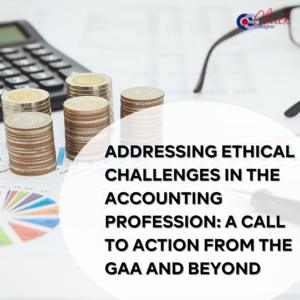 In whatever line of work, ethics serves as the bedrock upon which the trustworthiness of one’s work is constructed. But in the accounting world, where every statistic and every decision may affect the lifeline of enterprises and governments, it takes on a significance unmatched by any other field.
In whatever line of work, ethics serves as the bedrock upon which the trustworthiness of one’s work is constructed. But in the accounting world, where every statistic and every decision may affect the lifeline of enterprises and governments, it takes on a significance unmatched by any other field.
This was recently stressed by the Global Accounting Alliance (GAA), which said, “Our members – more than 1.4 million professionals – are woven throughout the global economy, helping strengthen businesses, governments, and ultimately communities…” The Global Accounting Alliance (GAA) recently emphasized this point in a passionate statement. Integrity, objectivity, secrecy, professional competence and due care, and professional behavior are all non-negotiable requirements, as was made very apparent in the message.
One thing that has remained consistent during my years as an ethics lecturer and author, especially in the accounting profession, is the overwhelming desire that professionals have to act in a way that is in the best interest of the public interest. It is not simply a matter of calculating figures or guaranteeing compliance with tax laws. The goal is to build a society based on openness, trust, and moral fortitude.
The statement issued by the GAA couldn’t have been released at a more opportune moment. The global landscape is shifting, and with it come new opportunities and problems brought on by technological advances and volatility in the economy. The statement acknowledged the increased strain that corporate executives and finance professionals are under. Still, it also offered a solution in the form of a call for accountants to participate in an “always-on” dialogue about ethical issues.
The public’s trust is not only a gift but a badge of honor that must be earned over time, as the GAA accurately reminds out. This trust is essential to the financial health of every organization. Instead of treating ethics as an afterthought, companies should build them into their organizational structure from the ground up. An added ethical rule is precisely what its name implies: an addition. It needs to be embedded for there to be meaningful integration.
The statement’s conclusion is a powerful reminder that ethics isn’t simply about complying with the rules; it’s about acting morally, especially when no one is looking. The Global Accounting Alliance underlines that “while each October we celebrate Global Ethics Day, ethics is our ‘every day.'”
Michael Izza, Chief Executive of the ICAEW, echoed these thoughts and underscored the gravity of the situation by saying, “Fostering an ethical culture matters now more than ever.” Continuing to uphold ethical standards is one of the most important aspects of being a professional chartered accountant. In addition, he is adamant that ethics shouldn’t merely be a label attached to the profession but rather an integral, active component of it.
The question now is, from whence do we go?
In situations like these, having extensive ethical training can come in handy. Knowing the distinction between good and evil is only one aspect of having ethical judgment. It’s not just about recognizing subtleties and ambiguities; you must also be equipped to deal with them.
Chuck Gallagher, a well-known author in the field of ethics, provides intensive training specifically geared toward meeting the requirements of the accounting industry. Training that sheds light on thorny ethical issues and fosters an environment in which making ethical choices comes naturally to employees and management alike is invaluable. Every choice created and action carried out needs to be analyzed within the framework of ethics to guarantee that the public’s welfare is always prioritized.
In a world where the only sure thing is change, let us band together, bolstered by the ethics and values we share, to face the challenges still in store. Not only is it our responsibility as professionals in the accounting field, but it’s also the right thing to do.


